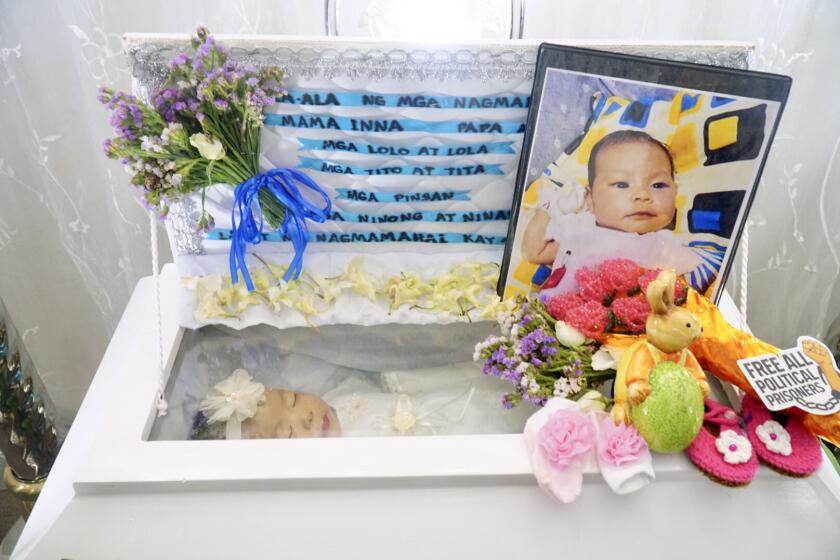One more humiliation for the accused and killed: leased graves that expire
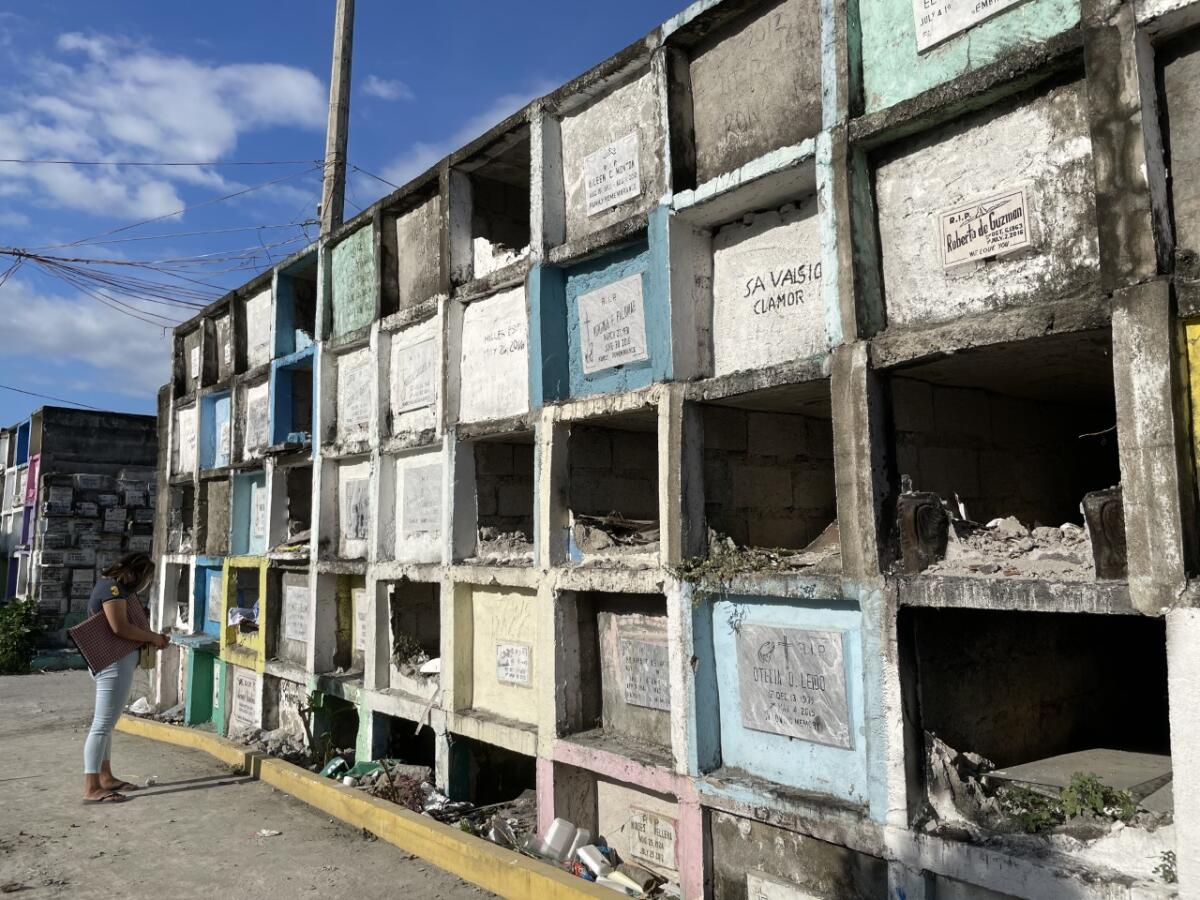
MANILA — There isn’t much in the way of dignity for the dead in Navotas Public Cemetery.
Remains are stacked in cinder-block holes five levels high. Their openings are cemented shut and painted in blue, yellow or pink pastels. Those whose families can’t afford a plaque have their names scrawled in black ink. On days when the humidity and breeze conspire, the stench of decomposing bodies hangs over grounds strewn with trash and uncollected bones.
Such is death for the poor and the accused in an unforgiving land. Yet one more humiliation awaits scores of those buried at the cemetery along Manila Bay. In a few months, the first wave of victims of Philippine President Rodrigo Duterte’s war on drugs will be exhumed and left for loved ones to relocate.
July marks the fifth anniversary of the bloody campaign in which thousands of mostly urban poor were killed in nightly sweeps by authorities and vigilantes. The raids in alleys and homes claimed the guilty and the innocent. So many of those gunned down are believed to be interred at Navotas that the site has been dubbed Tokhang Village, after the name given to the campaign, “Knock and plead.”
Like many burial sites in Manila, remains can be interred at Navotas only for a maximum of five years because of chronic overcrowding. After that, it’s up to families to pay for a permanent burial plot or a bone crypt. That was a burden few could afford — the average monthly salary in the Philippines is about $300 — even before the COVID-19 pandemic pushed millions more into poverty.
Many of those felled in the drug war are expected to meet the same ending as generations of impoverished Filipinos before: stuffed in rice sacks and stored in charnel houses or dumped in piles, mixed with rubble and gravel on the cemetery floor.
“It is only the poor who have this problem because the rich have spaces in private cemeteries and they rest there forever,” said Danny Pilario, a priest who founded an organization to care for widows and orphans left behind by the drug war. “The poor have to be evicted from their abodes, not only in life but also in death. They are homeless forever.”
With the deadline approaching, family members are frantically assessing their finances in hopes of avoiding a similar fate for their husbands, sons, cousins and uncles.
Hard-won access to family planning has diminished during the pandemic, with a resulting surge in births expected to strain healthcare resources.
It is a cruel math shared by many who come to Navotas, a place of few flowers, no repose and whispered words to saints. A 28-year-old woman whose father and brother were fatally shot on the same day in the summer of 2016 arrived on a recent afternoon.
She wiped away tears and sweat in the glare of a beating sun. She bowed her head and prayed, placing candles before the tombs.
She had come to see if a gravedigger had marked the site with an X, the common way families are alerted that exhumation is imminent. Ten years ago, she was stunned to discover a tomb belonging to another brother, this one killed in a gang fight, had been smashed open and his remains removed. She did not know then to look for an X. She didn’t want to make that mistake again.
On this day, there was no marking, but she was told that it wouldn’t be long before the remains of her father and her brother would be removed. Not only was their lease expiring, but the land she stood on also would soon make way for a building development.
The woman was one of 15 family members of victims of extrajudicial killings who spoke to The Times for this report. Like most of them, she recounted her ordeal on condition of anonymity for fear of retribution from the police.
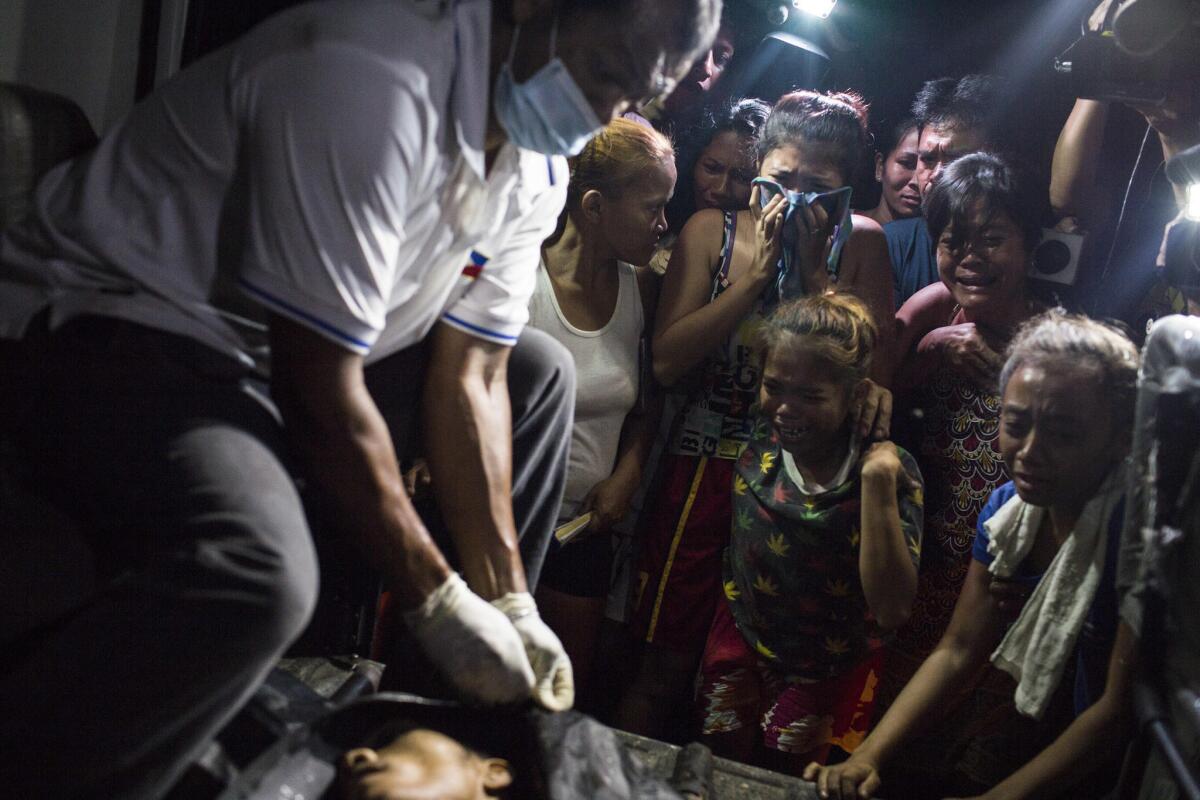
Her father, 53, and brother, 27, were drug dealers in their neighborhood when they were killed — the elder by police in a raid and the younger by unknown gunmen. The two sold shabu, a cheap methamphetamine known as the poor man’s cocaine that is ubiquitous in the Philippines, a major international transit hub for narcotics.
National disgust for that trade propelled Duterte’s political ascent and unleashed a wave of extrajudicial killings. As with most drug war fatalities, authorities claimed the woman’s father had resisted arrest. But the woman said he was asleep when police stormed their house and executed him. Guns were planted at the crime scene to support claims that he fought back. The woman’s 12-year-old sister witnessed the killing.
The family tumbled into crisis. The woman’s mother abandoned the family and moved in with another man. The woman not only had to care for her three children, but also four younger siblings and her brother’s two children.
To pay for the funeral and tombs, she sold her parents’ house and the family motorcycle. A former drug dealer, the woman these days lives on church donations and money earned selling tea. Jobs are scarce in Manila, which has been under months of COVID-19-related restrictions, contributing to the worst economic times in the Philippines since the country started publishing national data after World War II.
She needs hundreds of dollars she does not have for a permanent burial site for her father and her brother.
“I have to keep trying because I’m not sure if we can ever attain justice,” she said. “But knowing they have a decent resting place in the cemetery gives me peace of mind somehow.”
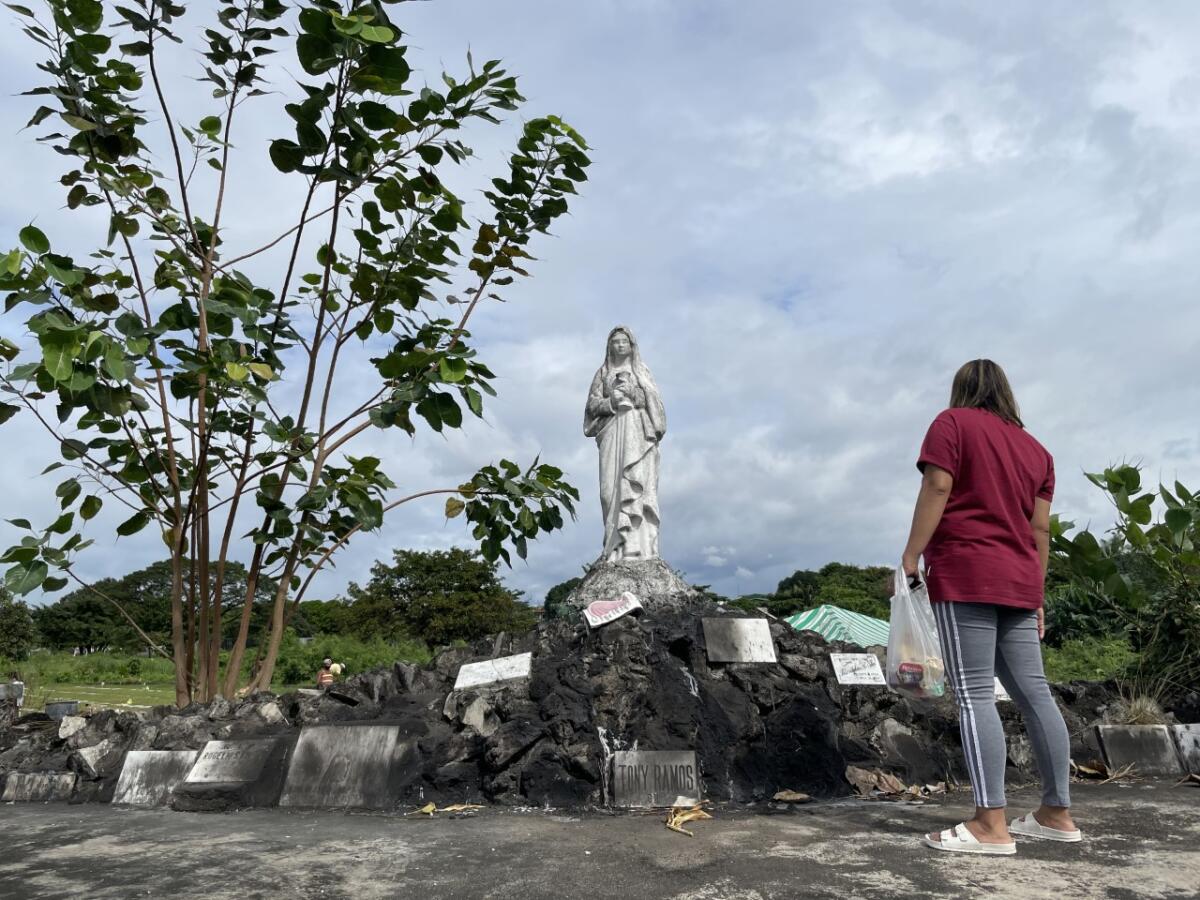
The systematic execution of thousands of suspected drug abusers and dealers has shaken the country but has not deterred Duterte, whose term ends next year.
Rather than sink the mercurial leader’s allure, his often vulgar pledges of street justice only made him more popular to his followers. The impunity of the drug war, which peaked in 2016 and 2017, emboldened Duterte to jail political rivals, silence independent media organizations and violently suppress human rights workers.
Amnesty International said an average of 34 people a day, or about 7,000 in all, were killed by police and vigilantes from July 1, 2016, to Jan. 21, 2017. There are no exact figures as to how many people have been killed since the drug war began. But human rights groups say the total number may be between 20,000 and 40,000.
At least 3,000 killings are under investigation by the Philippine Commission on Human Rights. Last year, Fatou Bensouda, prosecutor for the International Criminal Court at The Hague, said her office may investigate later this year to determine whether crimes against humanity had been committed.
In a move widely viewed as a bid to head off international scrutiny, Philippine Justice Secretary Menardo Guevarra acknowledged to the United Nations’ Human Rights Council in a speech last month that police had failed to follow standard protocols in thousands of drug-related deaths. That includes examining recovered guns, verifying ownership of firearms or conducting ballistic examinations.
Government critics say the remarks were short of an admission that guns found at crime scenes were planted as evidence.
As more proof of official wrongdoing emerges, calls are growing to keep the dead at Navotas and other cemeteries from being taken from their cinder-block graves.
“It’s enraging that families of drug war victims have to endure this in the middle of a pandemic,” said Rubilyn Litao, the coordinator of Rise Up, an ecumenical group that has documented hundreds of drug war cases. “They cannot even put food on the table.... Their loved ones should not have been killed in the first place.”
With seven children to feed, Rodalyn Adan has no way of paying $67 for her late husband’s remains to be exhumed and transferred to a permanent bone crypt, a resting spot that will eventually cost $21 a year to maintain.
A jailed Philippine activist is forced to attend her infant’s funeral in handcuffs and a hazmat suit
The death of Reina Mae Nasino’s 3-month-old daughter, River, has sparked an uproar over President Rodrigo Duterte’s crackdown on human rights defenders. The underweight infant was separated from her mother, denying her breast milk that could have prolonged her life.
Adan, 32, does not have a stable job but wants to keep her husband at Bagbag Cemetery in Quezon City so that her children can visit his tomb regularly. Her husband, Crisanto Abliter, was 32 when he was rounded up by police on Oct. 4, 2016, and never seen alive again.
“Our [youngest] child was still a baby when my husband was killed,” Adan said. “Our baby is 6 years old now and he’s always asking why his father refuses to get out of the niche. I tell him that it was because he was cemented inside the tomb.”
The improper handling of cases such as Abliter’s should prompt the government to stop or delay exhumations, said the Commission on Human Rights, an independent constitutional office.
“Mandatory disinterment of remains from public cemeteries after five years could potentially hinder current and prospective investigations into extrajudicial killings by complicating access to remains whose deaths are in question,” said Jacqueline De Guia, a spokeswoman for the commission.
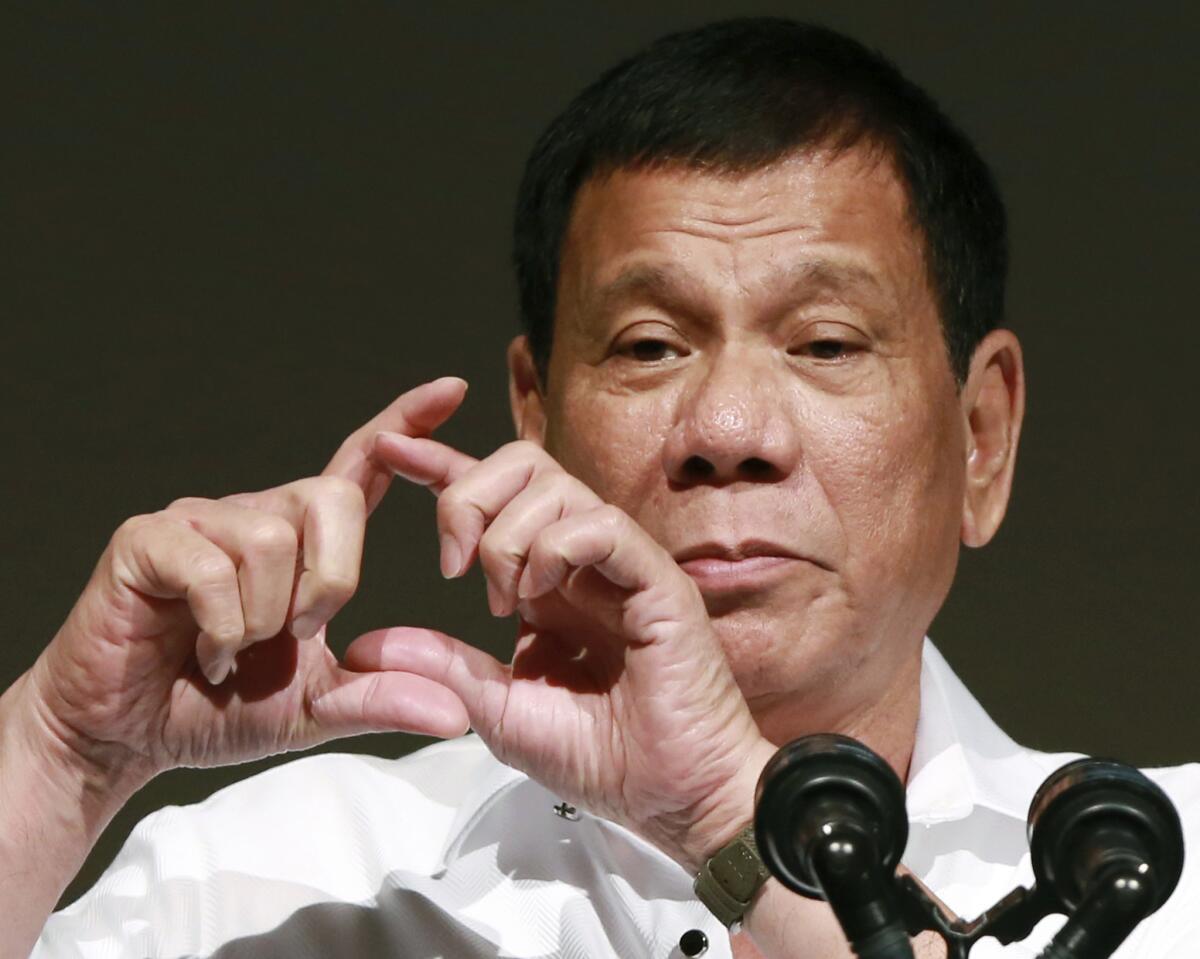
Marissa Lazaro’s 20-year-old son Christopher was shot dead by police after he was mistaken for a drug-addled thief as he was on his way home Aug. 4, 2017, in Bulacan province, north of Manila. A medical examiner told Lazaro that her son’s hands were tied when he was killed.
The lease for Christopher’s tomb will expire next year. She wants him to be reburied in a cemetery near the family’s home and a park where he used to play. She traveled thousands of miles and took a job as a domestic helper in Dubai, United Arab Emirates, to help pay for it all. But her employer was abusive. She quit her contract and returned home deeper in debt.
Lazaro knows what it’s like for a body to be forever lost. Her father died when she was 9. She does not know where his remains are.
They were exhumed without her mother’s permission. As a child, she often asked her aunts why they never paid respects to him in Manila North Cemetery. They said his body had been turned into “vetsin” powder, or monosodium glutamate. Traumatized by this joke, Lazaro refused to use MSG in her cooking for years, thinking they were sourced from human bones.
She needs $4,000 to move Christopher to a permanent place. It seems an impossible sum.
“My other children tell me: ‘Ma, stop prioritizing the dead.’ But I cannot allow my son to suffer the same fate as my father,” Lazaro said. People killed by the police “already died a gruesome death. Can’t they not have a decent repose?”
She doesn’t know if this will happen. But she is signing up to work overseas again.
Special correspondent Balagtas See reported from Manila and Times staff writer Pierson from Singapore.
More to Read
Sign up for Essential California
The most important California stories and recommendations in your inbox every morning.
You may occasionally receive promotional content from the Los Angeles Times.

